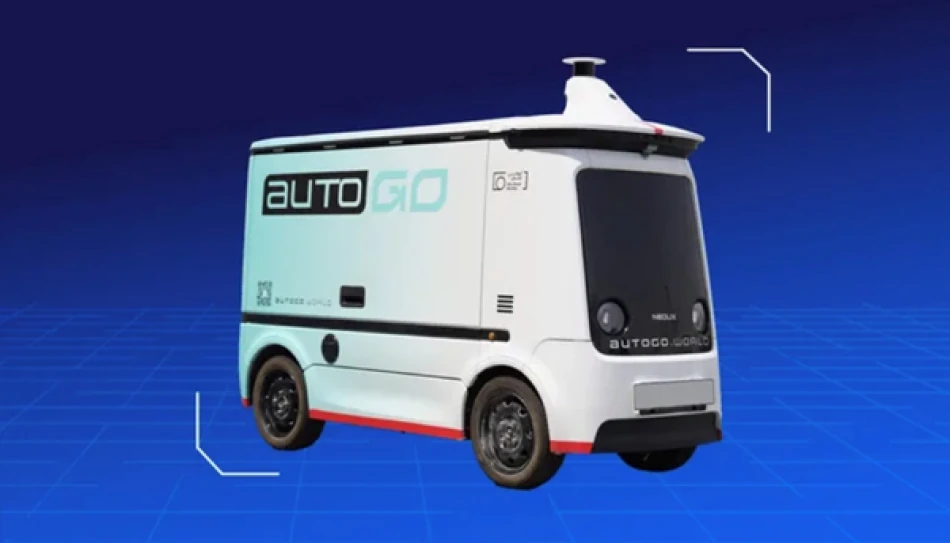
Abu Dhabi Mobility Launches Pioneering Autonomous Delivery Vehicle Pilot in the Emirate
Abu Dhabi Launches Middle East's First Licensed Autonomous Delivery Vehicles, Targeting 25% Smart Transport by 2040
Abu Dhabi has achieved a regional first by launching autonomous delivery vehicles with official license plates in Masdar City, marking a pivotal step toward the emirate's ambitious goal of making 25% of all trips autonomous by 2040. The pilot program, developed through partnerships between government agencies and private firms including K2 and Seven-X's logistics arm EMX, represents the most concrete progress yet in the Gulf's race to commercialize driverless technology.
Strategic Positioning in Global Autonomous Race
The initiative places Abu Dhabi ahead of regional competitors in autonomous vehicle deployment. While Dubai has experimented with driverless taxis and Singapore has conducted limited trials, Abu Dhabi's regulatory framework for delivery vehicles creates a clear pathway to commercial operations that other Gulf states have yet to establish.
The timing aligns with global trends where cities from Phoenix to Shenzhen are scaling autonomous delivery services. However, Abu Dhabi's approach differs significantly—rather than allowing tech companies to operate in regulatory gray areas, the emirate has created formal licensing structures from the outset.
Technology and Market Implications
AI-Powered Urban Navigation
The vehicles, developed by Autogo (a K2 subsidiary), utilize advanced AI-powered smart mobility technologies designed for urban street navigation without human intervention. This represents a significant technical achievement, as city driving presents far more complex scenarios than highway autonomous systems.
Commercial Expansion Timeline
Following the Masdar City trials, Autogo plans to expand operations beyond the controlled environment to include new partners and broader public areas, with full commercial deployment targeted for the coming months. This aggressive timeline suggests confidence in both the technology and regulatory framework.
Economic and Environmental Strategy
The autonomous delivery integration serves multiple strategic objectives for Abu Dhabi. Dr. Abdullah Hamad Al Ghafli, Acting Director General of the Integrated Transport Center, emphasized that the project extends beyond mere technological experimentation—it forms part of a comprehensive strategy to enhance smart logistics services while reducing emissions and traffic congestion.
For investors and logistics companies, this creates new market opportunities. The regulatory clarity provides a foundation for scaling operations that has been absent in many other markets where autonomous vehicles operate in legal uncertainty.
Regional Leadership and Future Implications
Tarek Al Wahedi, CEO of Seven-X, characterized the regulatory inclusion as a "strategic turning point toward the next generation of smart logistics ecosystems." This language suggests the companies view Abu Dhabi as a launchpad for broader regional expansion.
The initiative connects to Abu Dhabi's broader "Smart and Autonomous Vehicle Industry Complex" vision, which aims to develop smart infrastructure and localize production of autonomous systems within the emirate. This industrial strategy could position Abu Dhabi as a manufacturing and testing hub for the broader Middle East and North Africa region.
Market Differentiation and Risk Assessment
Unlike the gradual rollouts seen in U.S. cities or the heavily controlled environments of Chinese pilot programs, Abu Dhabi's approach balances innovation speed with regulatory oversight. The formal licensing system provides legal certainty that could attract international autonomous vehicle companies seeking stable regulatory environments.
The success of this program will likely influence policy decisions across the Gulf Cooperation Council countries, potentially creating a regional standard for autonomous vehicle regulation. For global logistics companies, Abu Dhabi's framework offers a model for how emerging markets might integrate autonomous delivery systems more rapidly than developed economies constrained by legacy regulations.
Most Viewed News

 Layla Al Mansoori
Layla Al Mansoori






